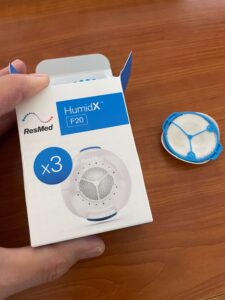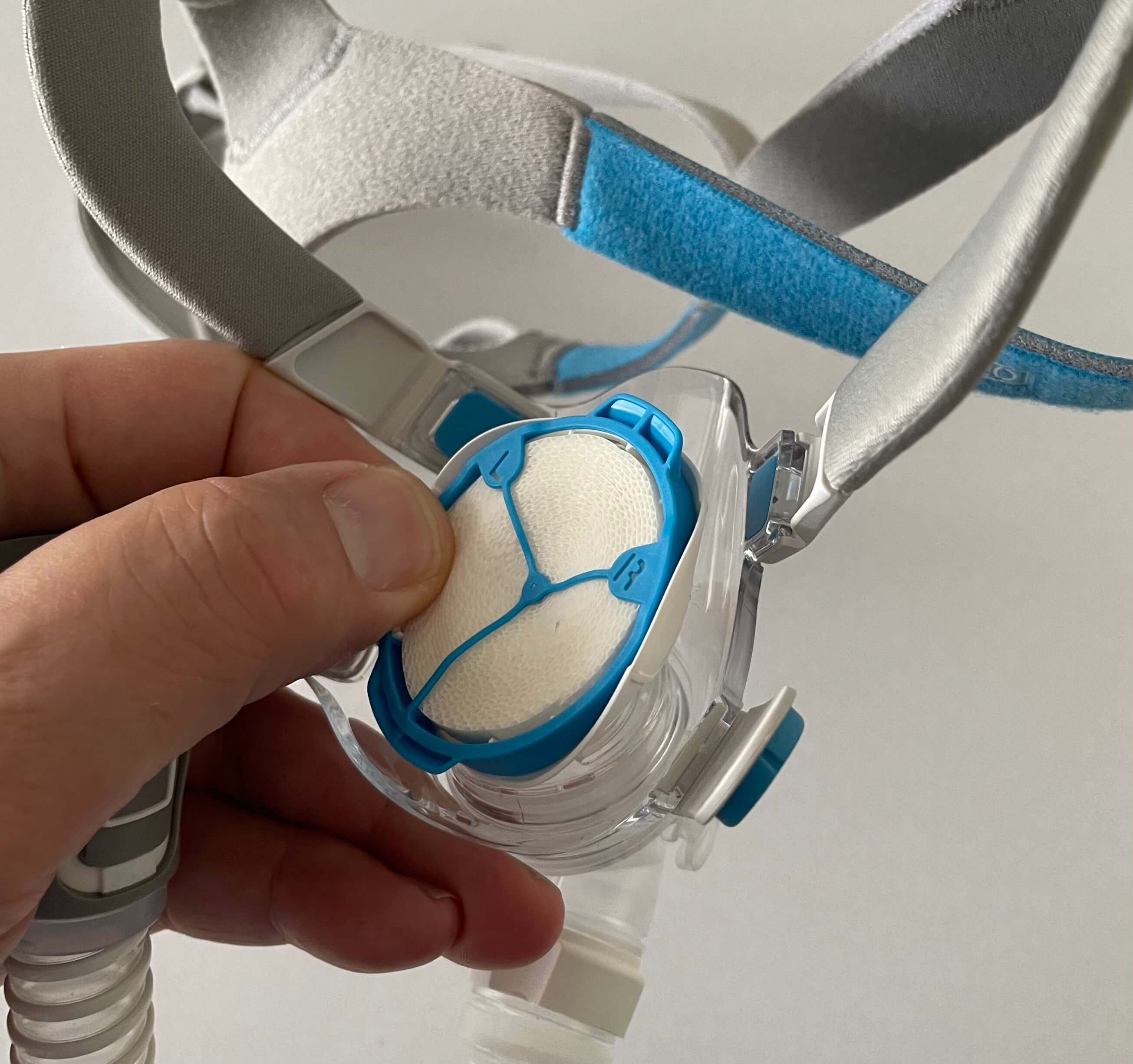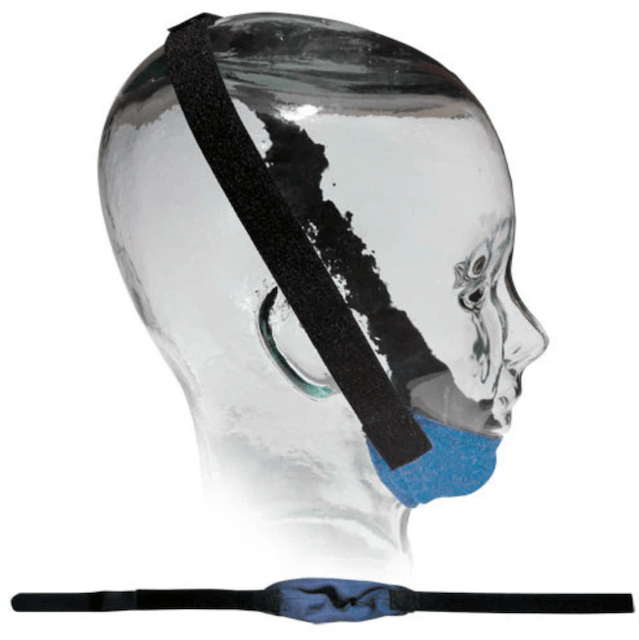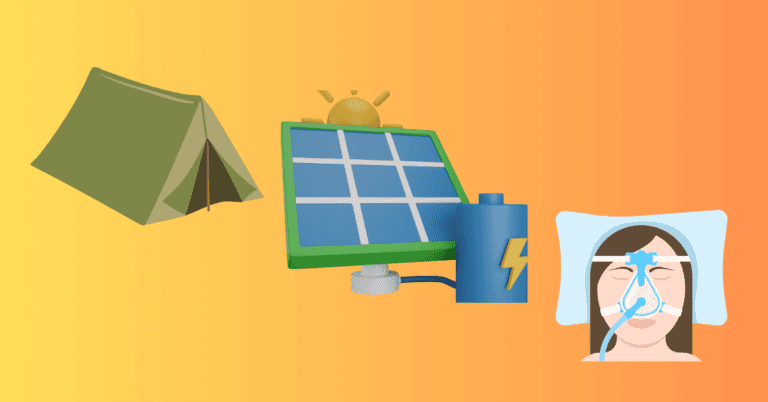Ultimate Guide to CPAP (HME) Heat Moisture Exchanger filters.
Jeremy Smith is a long-term CPAP user and sleep apnea advocate. After being diagnosed with severe obstructive sleep apnea, he created ByJeremySmith.com to help others navigate CPAP therapy through personal stories, gear reviews, and practical advice.
I don’t know about you, but I have no problems with my CPAP humidity tray.
But what happens if you want to go away and maybe go camping. Then you’ll probably need a CPAP machine that uses a (HME) Heat Moisture Exchanger filter.

These are the ones I took to Europe with my ResMed travel CPAP.
So what are these little CME things? How do they work. In this guide I’ll be taking a look.
What is a Heat Moisture Exchanger (HME)?
A Heat Moisture Exchanger, or HME, is a passive humidifier that helps keep the air you breathe during CPAP therapy warm and moist.
It works by capturing the moisture and heat from your own exhaled breath and reintroducing it into the airflow as you inhale. Think of it as a mini humidifier but without the need for a water chamber or electricity.
For those using CPAP machines, especially those who travel frequently or live in dry climates, an HME can significantly enhance comfort and reduce the common side effects of dryness, nasal irritation, and throat discomfort.
How Does a HME Work?
The HME is typically placed between the CPAP mask and the tubing. It contains a special material that absorbs the warmth and humidity from each breath you exhale.

When you inhale, the HME releases this stored heat and moisture back into the incoming air, creating a more comfortable breathing experience.
The device operates without any external power source or water. It’s small, lightweight, and easy to attach, making it an ideal option for people who want a low-maintenance humidification solution.
Benefits of Using an HME with Your CPAP Machine
Wondering if an HME is worth the investment? Here are some compelling benefits:
1. Enhanced Comfort Without a Full Humidifier Setup
One of the primary reasons CPAP users choose an HME is for the added comfort it brings.
Nasal dryness and sore throats are common complaints among CPAP users, particularly if they don’t use any humidification. An HME can significantly mitigate these issues without the need for a traditional heated humidifier.
2. Convenience and Portability
HMEs are a dream come true for travelers or those who have limited space. They don’t require any water or electricity, making them a perfect option when you’re on the go.
I remember a time when I was traveling, and carrying my bulky humidifier setup just wasn’t practical. Switching to an HME made it so much easier to manage my CPAP therapy on the road.
3. Reduced Maintenance
Tired of cleaning your humidifier’s water chamber every few days? With an HME, you can skip that hassle.
Since it doesn’t use water, there’s no risk of mold or bacteria growth, and no need for constant cleaning.
Simply replace the HME every few weeks, and you’re good to go.
4. Energy-Efficient Solution
Because HMEs don’t use any electricity, they’re an eco-friendly and cost-effective option.
You’ll save on energy bills and won’t have to worry about using extra power adapters when traveling abroad.
Who Should Consider Using an HME?
An HME might not be for everyone, but there are certain scenarios where it can be particularly beneficial:
- Frequent Travelers: If you travel often, an HME can simplify your setup and eliminate the need to carry distilled water.
- Dry Climate Dwellers: Those living in areas with low humidity might experience nasal dryness and throat irritation more frequently. An HME can add just enough moisture to reduce these symptoms.
- Occasional CPAP Users: If you only use CPAP occasionally or for short periods, an HME is a convenient, no-fuss option.
- People Who Dislike Heated Humidifiers: Some people find that heated humidifiers make them feel stuffy or congested. An HME offers a milder form of humidification that may feel more comfortable.
Drawbacks and Considerations
While HMEs are a great alternative for many, they may not be suitable for everyone. Here are a few potential drawbacks:
1. Lower Humidification Levels
Compared to traditional heated humidifiers, HMEs offer lower humidification. If you have severe dryness or experience significant sinus congestion, an HME might not provide enough moisture for you.
2. Replacement Frequency
HMEs need to be replaced more frequently than water-based humidifiers. Most manufacturers recommend changing the HME every 1-2 weeks to ensure optimal performance.
3. Compatibility Issues
Not all HMEs are compatible with every CPAP setup. You’ll need to check if your mask and tubing can accommodate the specific HME you’re considering.
4. Noise
This was a big issue for. As these little devices break up your airflow, a side effect is that they can be quite noisy.
How to Choose the Right HME for Your Needs
When selecting an HME, consider the following factors to ensure you pick the best one for your CPAP therapy:
Size and Compatibility
HMEs come in various sizes and are designed to fit different mask and tubing setups. Make sure the HME you choose is compatible with your specific CPAP configuration.
Replacement Schedule
Look for an HME with a convenient replacement schedule. While some can last up to a month, others need to be replaced every 1-2 weeks. Choosing a longer-lasting option can save you money and reduce the hassle of frequent replacements.
Brand Reputation
Stick to reputable brands that specialize in sleep therapy products. Reliable manufacturers like ResMed, Philips Respironics, and Fisher & Paykel offer high-quality HMEs that have been tested and proven effective.
Top Recommended HMEs for CPAP Users
Based on user reviews and expert recommendations, here are a few top-rated HMEs to consider:
- ResMed HumidX/HumidX Plus – Designed specifically for ResMed’s AirMini travel CPAP, the HumidX and HumidX Plus provide effective humidification in a compact form. The HumidX Plus offers extra moisture for drier environments.
- Fisher & Paykel HME Filter – Known for its efficiency and durability, this HME is a great option for CPAP users looking for an easy-to-use and reliable humidification solution.
- Philips Respironics HME – Compatible with a wide range of CPAP devices, the Philips Respironics HME is lightweight, portable, and easy to replace.
Final Thoughts: Is an HME Right for You?
Heat Moisture Exchangers are a fantastic option for CPAP users seeking a simpler, more portable humidification solution.
While they may not offer the same level of moisture as a traditional heated humidifier, they’re perfect for travel, occasional use, or those who experience mild dryness during therapy.
If you’re unsure whether an HME is right for you, consider giving one a try and see how it affects your comfort and sleep quality. You can always switch back to your heated humidifier if you need more moisture.

Finally, I would not recommend buying an HME machine as your main therapy machine. They are noisier and not as effective as a bedside conventional CPAP machine. However, they are great for when you go traveling.
Disclaimer: The content on this blog is for informational and educational purposes only and is not a substitute for professional medical advice. Always speak with your doctor or sleep specialist before starting, stopping, or changing any treatment or therapy related to sleep apnea or CPAP use.





